By Liz Chavez, Lisa Maishman, Emily Bill, Louise de Boer and Pia Coates
Each year, educators at SOEL engage in research with the children to dig deep into an idea or concept. Researching is a process of co-constructing with children to explore new ideas using critical thinking skills. It is not the transferring of knowledge from teacher to child.
At our first age group network meetings for 2024, we unpacked what it means to be a co-researcher with children and to view yourself as a researcher. A few weeks ago, during our second round of age group network meetings, we had de opportunity to share our progress and engagement with this year’s long-term research ideas.
Networking Meetings. Educators reflect and share possibilities for our 2023 research
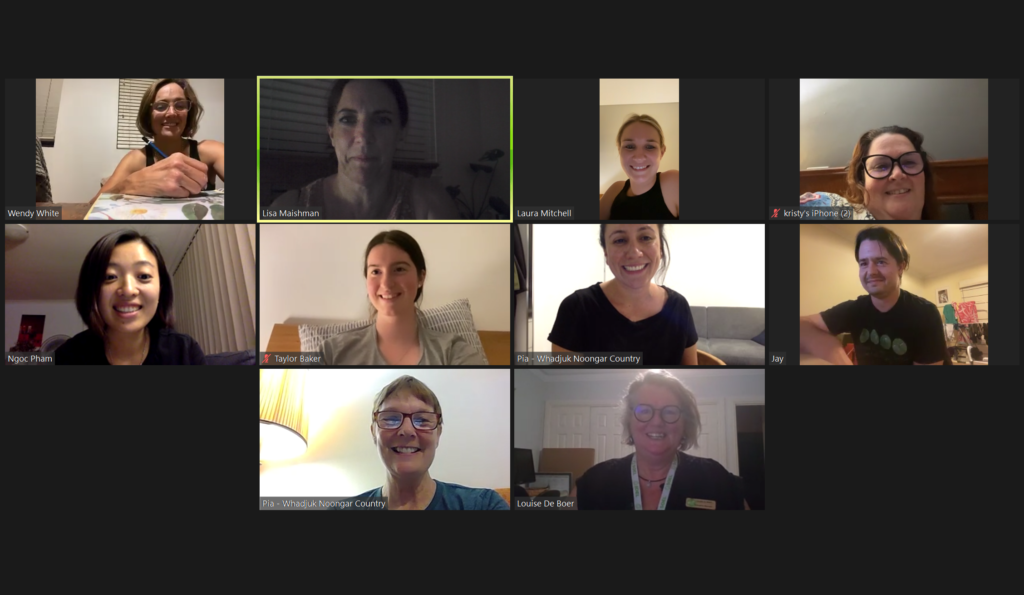

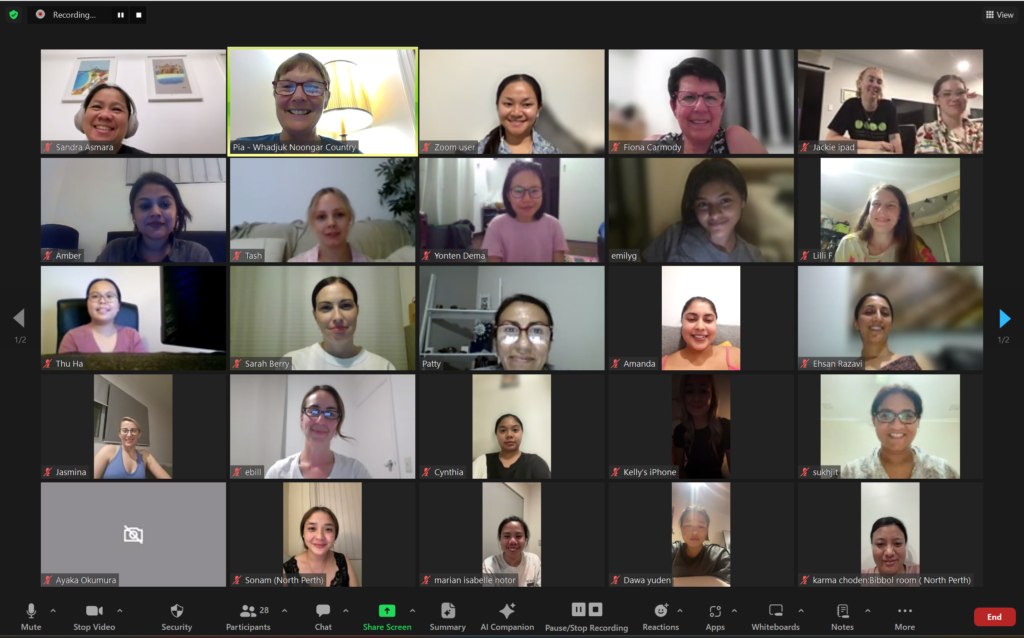

“The role of the teacher in Reggio is not to teach, but to learn. Together teachers are continually researching. What does each of us know and what have we observed and considered, that can be usefully shared in an ongoing, mutual experience? When teachers make listening and documentation central to their practice, they transform themselves into researchers.”
Carla Rinaldi, from the Schools of Reggio Emilia states:
Carla Rinaldi’s thoughts offer us an important idea to consider before embarking on research with children. We need to transform our belief that children are not researchers, and that we have nothing to learn from children. When we value children as researchers we begin to document (observations, photographs, recordings, sample of work) their play, ideas, theories. This documentation is known by the Schools of Reggio Emilia as visible listening, which means being open to the theories of children, (and your own thinking).
Documenting is not only completed at the end of the research, but throughout the life and experiences of the research. Documentation as an act of caring, and an act of love and interaction.
Our research BIG ideas and concepts continue to be underpinned by the Early Years Learning Framework Principles and Practices, EYLF Outcomes and our SOEL Values of resilience, mindfulness, curiosity, leadership and integrity.
In 2024 the research ideas from last year are continuing however with an added focus and book as a provocation for educator research.
| Age Group | Added Focus | Focus Book |
|---|---|---|
| Babies | Rituals | Ritual by Memory Lyon and Toni Christie |
| Toddlers | Pedagogy of Listening | Really Seeing Children by Deb Curtis |
| 3 Year Old Kindy | Diversity | The Anti-Bias Approach in Early Childhood 4th Ed edited by Red Ruby Scarlett |
| 4 Year Old Kindy | Advocacy | The Anti-Bias Approach in Early Childhood 4th Ed edited by Red Ruby Scarlett |
The 2024 Research focus that our Baby and Studio educators are currently engaged in is:
“Babies Being Seen, Heard and Acknowledged through everyday rituals.”
SOEL Values: Curiosity and Leadership
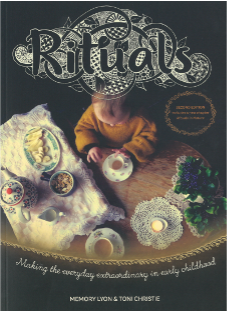

Rituals mark the passages that spin our lives forward…
We come together in community to honour each other and to recognize life’s unfolding. Religious rites and sacraments ritualize encounters with the sacred and cultivate hope for further holy visitations.
Simpler rituals celebrate the daily goodness and generosity of our lives: we say grace, we raise toasts, we kiss each other goodnight. (Pelo, 2013)
Early Childhood Rituals celebrate the important aspects of routine and the principles of attachment, while leaving behind the need to rush, tick checklists or become distracted from the purpose of our interaction with the child.
The National Quality Standards and the Early Years learning framework is explicit when using the words Routines and Rituals. EYLF V2. Cultural responsiveness P 24/ EYLF V2 O1.1, p 33/ EYLF O3, p 35 / NQS 5.1.1.
Although similar in some respects, rituals are different from routines. Rituals make the everyday extraordinary with infants and young children. Rituals support babies to have a strong sense of identity by making them feel safe, secure and supported.
Rituals involve a sequence of actions or process (just like a routine) but they set the tone for: Peace, love, pace and care. Rituals are purposeful, symbolic, creative, require full attention, awareness, beauty, collaboration, and intention.
Routines are: Predictable, necessary, have restrictive time frames often auto pilot and rushed. (Christie and Lyon 2022. Rituals)
The 2024 Research focus that our Toddler and Studio educators are currently engaged in is:
“Shared delight in play through the Pedagogy of Listening”
SOEL Values: Curiosity, Mindfulness, Resilience
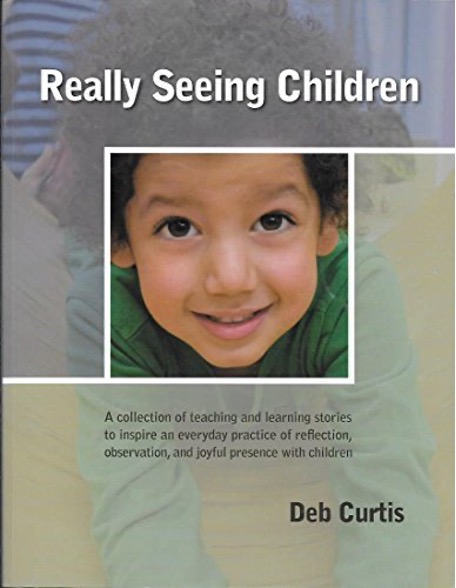

“We do not believe in ourselves until someone reveals that deep inside us something is valuable, worth listening to, worthy of our trust, sacred to our touch. Once we believe in ourselves, we can risk curiosity, wonder, spontaneous delight or any experience that reveals the human spirit.” E.E. Cummings
The idea around “Shared delight” comes directly from the Circle of Security Framework.
“Delight in me” is an important capacity to build secure attachments. “Delight in me” is the only need represented at the top and at the bottom of the circle. As educators, is easy for us to identify when children are delighted but the important aspect of this research is for us, as educators, to show our delight about the children’s ideas, theories and presence. Young children experience themselves through our eyes, so by communicating our delight with the children, the message we are sending is one of unconditional belonging, care and attention which are the origins of self-worth.
Why are we focussing on the Pedagogy of Listening? When children develop understandings, they create a narrative that gives meaning to their world (or situation) around them. These narratives are what we call children’s theories of their ideas of the world. These theories are to be taken seriously as they demonstrate thinking and are continuously reworked and adapted by the child.
These theories need to be listened to by others. “This is the reason why ANY THEORY, in order to exist needs to be expressed, communicated, and listened to by others. Herein lies the “Pedagogy of Relationships and Listening”, which distinguishes the work in Reggio Emilia. Carla Rinaldi 2001
LISTENING gives us a glimpse into the child’s search for meaning.
LISTENING is mostly done with our senses not only with our ears.
LISTENING is generated by curiosity.
The National Quality Standards and the Early Years learning framework is explicit when using a relational pedagogy underpinning our practice as Early Childhood professionals as well was a Play based approach to Learning. EYLF V2. Principle: Secure, respectful and reciprocal relationships/ Practices: Play based learning and intentionality and Responsiveness to children. Holistic, Integrated and Interconnected approaches/ NQS 1.2.2/ NQS 5.1.1/ NQS 5.2.1s
The 2024 Research focus that our 3 Year Old Kindy and Studio educators are engaged in is:
“Diversity in Community (Anti-bias Goal Number 2) ”
SOEL Values: Curiosity, Leadership, Mindfulness, Integrity.
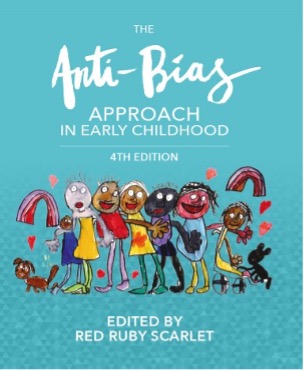

‘Children are part of multiple worlds. They are not solely confined to home and educational contexts. Often community participation is part of the curriculum – whether this happens during the day as local walks, or planned excursions, when children are at the setting, or after hours when children and their families attend community events. There are fertile opportunities to grow anti-bias approaches beyond the space of the setting and into the broader community … (The Anti-Bias Approach in Early Childhood; Chapter 17, p.115)
Diversity: multiplicities, variations, different ways and states of being. Social and cultural recognition of individual and group identities. The word diversity is mentioned 57 times in the EYLF V2
When embarking on a learning journey with young children about diversity in early childhood, we are offering them different ways of being encouraging them to see differences as positive, exciting, and enriching opportunities and quite often as “just a different way of doing things.” This build the child’s sense of self, their identity and self-esteem, and builds a strong inclusive community where everyone enjoys a sense of belonging.
Community: The word community is mentioned 77 times in the EYLF V2.
The National Quality Standards and the Early Years Learning Framework is explicit when using the words Diversity, Community and in the use of the words each child. EYLF V2. Respect for Diversity p16/ EYLF V2 O1, p30/ EYLF V2, O2 p 38 / EYLF V2 O4.1 & 4.4 p50 /EYLF V2 O5.3 p62/ NQS QA3 – Diverse range of experiences /EYLF V2. Partnerships/QA6.1.2 – Families views are respected/QA5.1.2 – Dignity & Rights of the child.
The 2024 Research focus that our 4 Year Old Kindy and Studio educators are engaged in is:
“Justice and Advocacy (Anti-bias Gaol 3 and 4)”
SOEL Values: Curiosity, Leadership, Mindfulness, Integrity.
This year’s long-term research focus for the children and educators in the 4 year old kindy rooms invites us to continue to investigate the concept of social justice and the four anti-bias goals.
Some of the ways we are engaging with this includes:
- Democracy – Using wearable objects to make abstract ideas, concrete for children.
- language to include – power to include or exclude.
- forums and being heard in a forum or group time.
- diversity – family diversity, different ways of being and doing. “The diverse classroom”.
- Everyday acts of inclusion.
- Being welcomed and welcome in.
- Small everyday acts of kindness
One child, one teacher, one book and one pen, can change the world.
Malala Yousafzai
One of the ways that you as a family could engage with this research idea is to reflect upon your families’ everyday acts of inclusion. For example, what are the moments in your family when your children participate (mealtimes, tidying up, participating in decision making)?
Educators discuss and share ideas about the long-term research at each age group educators’ network meeting. Children’s engagement in this research is currently being shared with you through Storypark posts, visible displays, documentation and your conversations with educators, Educational Leaders, and Studio educators.
We are looking forward to continuing to share this journey with you.

